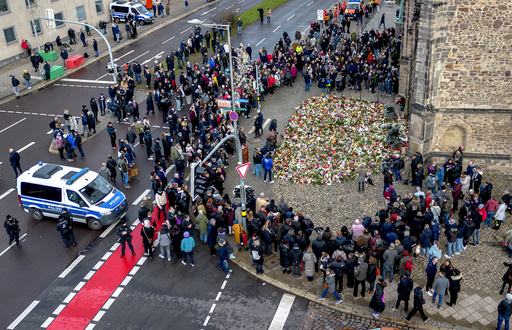
MAGDEBURG, Germany — Authorities in Germany have revealed that they received alerts last year concerning the individual responsible for a tragic car assault at a Christmas market in Magdeburg, which resulted in the loss of five lives.
The suspect is identified as a Saudi national who has been residing in Germany since 2006 and has permanent residency status. While police have not disclosed his name due to privacy regulations, some media outlets have referred to him as Taleb A., and it has been reported that he specialized in psychiatry and psychotherapy.
Officials stated that he does not conform to the typical profile of those engaging in extremist violence. The suspect has identified himself as an ex-Muslim and has openly criticized Islam, expressing support for far-right anti-immigration sentiments through various social media platforms, particularly for the Alternative for Germany (AfD) party.
He is currently detained as investigations are ongoing. Interior Minister Nancy Faeser commented on the incident, stating, “This perpetrator acted in an unbelievably cruel and brutal manner — like an Islamist terrorist, although he was obviously ideologically an Islamophobe.”
Initially residing in Mecklenburg-Western Pomerania, the suspect completed his specialist training in Stralsund. Authorities noted that he had previously drawn attention due to threatening behavior. State Interior Minister Christian Pegel conveyed that in a dispute over the validation of his exam results, he threatened members of the state medical association with an act designed to capture global attention, leading to an investigation and a home search. Despite the search yielding no evidence of concrete attack plans, a court convicted him of making threats in 2013.
Following that incident, additional threats were reported, according to Pegel. Holger Münch, head of the Federal Criminal Police Office, stated in an interview that they received a warning from Saudi Arabia in November 2023, prompting the initiation of “appropriate investigative measures.” He reiterated that the suspect was known for a significant number of online posts and various interactions with authorities, including threats, yet he was not known to have committed any violent acts.
The Federal Office for Migration and Refugees also indicated that they received an alert regarding the suspect in late summer of the previous year. In a statement on social media, they confirmed that all tips are taken seriously but emphasized their role does not involve conducting investigations; rather, they pass on information to the respective entities.
In the wake of the attack, the Central Council of Ex-Muslims expressed their shock, declaring that the suspect had been a source of fear for them for years. They highlighted that he appeared to adopt beliefs aligned with far-right ideologies and posited that he believed in a broad conspiracy aimed at Islamizing Germany, concluding that his delusions led him to regard even organizations that scrutinized Islamism as part of this conspiracy. Chairwoman Mina Ahadi characterized him as a possible psychopath influenced by extreme right-wing conspiracy theories.
The police in Magdeburg confirmed that the victims of the assault included four women, aged 45, 52, 67, and 75, along with a 9-year-old boy. In total, 200 individuals sustained injuries, with 41 sustaining severe injuries and receiving treatment in various hospitals across Magdeburg, located approximately 130 kilometers (80 miles) west of Berlin.
On Saturday evening, the suspect was presented before a judge, who ordered him to remain in custody on allegations of murder and attempted murder, with a potential indictment forthcoming.
The horror incited by this latest act of mass violence is expected to keep migration as a central topic as Germany approaches an early election set for February 23. A previous knife attack attributed to an alleged Islamic extremist from Syria in Solingen in August had already escalated the migration debate, prompting Chancellor Olaf Scholz’s administration to enhance border control measures.
Right-wing figures across Europe criticized German authorities for the substantial levels of migration allowed in recent years, attributing perceived security vulnerabilities to these policies. Hungarian Prime Minister Viktor Orbán, known for his staunch anti-migration stance, seized on the incident in Germany to critique the European Union’s migration strategy, labeling it a “terrorist act.” During a press conference in Budapest, he asserted that “there is no doubt that there is a link between the changed world in Western Europe, the migration that flows there, especially illegal migration, and terrorist acts.”
